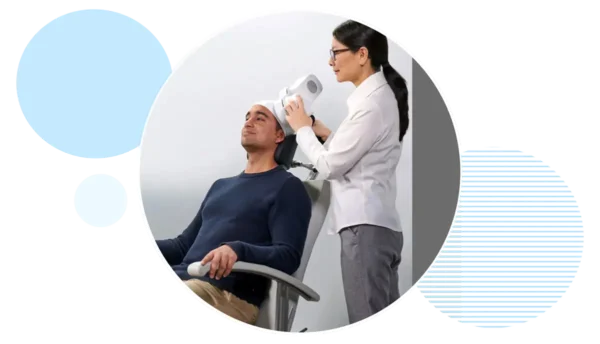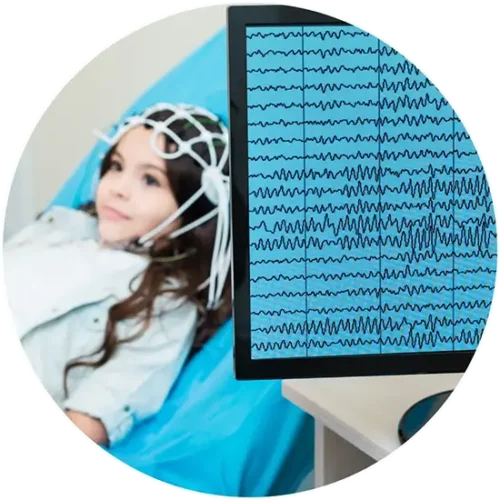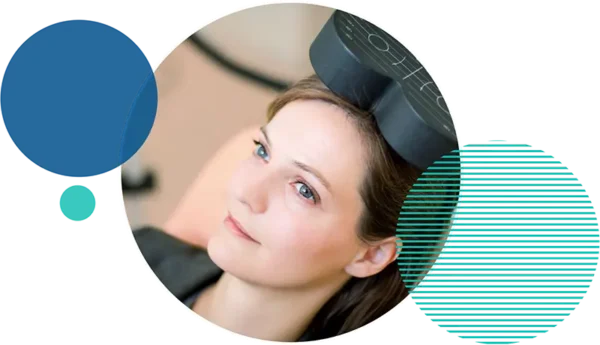MeRT, A Non-Invasive, Drug-Free Treatment for PTSD, Post Traumatic Stress Disorder, Has Seen Some Incredible Results
Understanding PTSD Through Brainwave Patterns
 Recent studies have shown that individuals with Post-Traumatic Stress Disorder (PTSD) exhibit distinct patterns in their brainwave activity, as seen through EEG scans. These findings suggest that traumatic experiences can alter the brain’s function, particularly affecting neural pathways involved in emotional regulation and cognitive processing.
Recent studies have shown that individuals with Post-Traumatic Stress Disorder (PTSD) exhibit distinct patterns in their brainwave activity, as seen through EEG scans. These findings suggest that traumatic experiences can alter the brain’s function, particularly affecting neural pathways involved in emotional regulation and cognitive processing.
Many patients with PTSD show abnormalities in the frontal region of the brain. EEG scans frequently reveal two conflicting alpha wave frequencies in this area, along with excessive delta and theta activity—low-frequency waves that typically dominate during sleep or deep relaxation. These irregularities disrupt the brain’s normal rhythm, which should ideally show a dominant, consistent alpha pattern. Our approach focuses on detecting these imbalances and promoting healthier brainwave patterns to help alleviate PTSD symptoms.
Tailored Brain Therapy: MeRT®
We use a highly personalized approach called MeRT® (Magnetic e-Resonance Therapy) to support each individual’s neurological recovery. This technique involves using magnetic stimulation to recalibrate the brain’s electrical activity. The therapy plan is crafted based on an in-depth analysis of each patient’s EEG and EKG data, allowing for precise adjustments in stimulation frequency, intensity, and target location.
The process begins with a quantitative EEG to capture a detailed map of the patient’s brainwave activity. Our scientific team analyzes the data to create a treatment plan that addresses the patient’s unique neurological profile. You’ll then meet with a clinician who will walk you through your personalized protocol and what to expect from the therapy.
Because no two brains are the same, every treatment plan is uniquely tailored. This individualized method often results in substantial improvements in symptoms and overall mental health.
The equipment used for MeRT is FDA-cleared, and the rTMS technology it relies on is FDA-approved for treating conditions like Major Depressive Disorder and Obsessive-Compulsive Disorder. While MeRT is considered an off-label application for PTSD, many patients experience positive outcomes in managing trauma-related symptoms.
At Novara Healthcare, our Houston ASD Clinic, we are dedicated to helping patients and families address these challenges through innovative, compassionate care designed to unlock each individual’s potential.
What is PTSD?
 Post-Traumatic Stress Disorder (PTSD) is a mental health condition that can develop after someone experiences or witnesses a traumatic event or extended period of extreme stress or abuse. This could include anything from combat exposure and serious accidents to physical or mental assault or natural disasters. PTSD doesn’t just affect emotions—it impacts how the brain processes and responds to stress, often keeping the person stuck in a state of heightened alertness or emotional distress long after the danger has passed.
Post-Traumatic Stress Disorder (PTSD) is a mental health condition that can develop after someone experiences or witnesses a traumatic event or extended period of extreme stress or abuse. This could include anything from combat exposure and serious accidents to physical or mental assault or natural disasters. PTSD doesn’t just affect emotions—it impacts how the brain processes and responds to stress, often keeping the person stuck in a state of heightened alertness or emotional distress long after the danger has passed.
Some of the symptoms can include difficulty sleeping, nightmares, a negative outlook, anxiety or panic attacks, depression, inability to deal with stress, feeling numb, easily startled, and extreme emotional responses.
People with PTSD may relive the traumatic event through flashbacks, nightmares, or intrusive thoughts. They might also avoid people, places, or situations that remind them of what happened. It’s common for individuals to feel emotionally numb, anxious, irritable, or disconnected from others.
What makes PTSD different from a typical stress response is how long these symptoms last and how deeply they interfere with daily life. Instead of fading over time, the stress response becomes ingrained, leading to ongoing mental and physical challenges. Fortunately, with the right treatment and support, many people with PTSD can find relief and begin to heal.
What is MeRT?
 MeRT (Magnetic e-Resonance Therapy) is a next-generation advancement in brain modulation—offering a far more individualized approach than traditional Transcranial Magnetic Stimulation (TMS). While both therapies use magnetic pulses to influence brain activity, MeRT is distinctly customized. Every aspect of the treatment—frequency, location, and intensity—is tailored to the individual’s unique brainwave patterns.
MeRT (Magnetic e-Resonance Therapy) is a next-generation advancement in brain modulation—offering a far more individualized approach than traditional Transcranial Magnetic Stimulation (TMS). While both therapies use magnetic pulses to influence brain activity, MeRT is distinctly customized. Every aspect of the treatment—frequency, location, and intensity—is tailored to the individual’s unique brainwave patterns.
TMS devices, which are FDA-cleared for conditions like Major Depressive Disorder and OCD, are also used off-label to help with a variety of neurological challenges, including Autism Spectrum Disorder, Anxiety, and PTSD. MeRT builds on this foundation, enhancing its effectiveness through advanced diagnostic tools.
By integrating Transcranial Magnetic Stimulation with Quantitative EEG (qEEG), MeRT allows clinicians to assess each patient’s brainwave activity in extraordinary detail. This data guides the creation of a completely customized treatment plan, unlike standard TMS.
Where traditional TMS might stimulate a fixed brain region at a preset frequency, MeRT identifies exactly which areas need support and how best to stimulate them. Through in-depth brain mapping and functional analysis, we determine optimal neural synchronization and then use that insight to restore better brain communication.
For individuals with PTSD, treatment typically spans six weeks, with brief sessions (30–45 minutes) held Monday through Friday. Many begin noticing changes within the first few weeks—such as better sleep, improved mood, less anxiety, and increased social engagement.*
Years of Research Support MeRT’s Role in PTSD Treatment
MeRT incorporates targeted repetitive Transcranial Magnetic Stimulation (rTMS)—a technique that has been the focus of numerous clinical studies for its effectiveness in addressing symptoms of Post Traumatic Stress Disorder (PTSD). With a growing body of research conducted over many years, the evidence continues to build in support of rTMS as a valuable component of PTSD recovery. Below are just a few of the studies highlighting its positive impact.
A retrospective chart review to assess the impact of alpha- guided transcranial magnetic stimulation on symptoms of PTSD and depression in active-duty special operations service members, 21 June 2024. “This data provides a demonstration of significant reduction in PTSD and depression symptoms and safety with the application of a-rTMS in active-duty special operations military personnel. Expansion of targeted neuromodulation programs could be impactful for military and civilian populations.”
How Electric Therapy Is Curing Navy SEALs of PTSD, Jan 2019. “Hundreds of vets have tried out an experimental new treatment that could change how the world addresses mental disorders.” And, “All said that they saw big improvements after a course of therapy that ran five days a week for about four weeks.”
Synchronized transcranial magnetic stimulation for posttraumatic stress disorder and comorbid major depression: “All participants demonstrated significant reductions in PTSD and MDD symptoms (all p < .001). As expected, there were significant reductions in symptoms in both treatment groups, but active stimulation did provide greater reductions in count of PTSD moderate-to-severe symptoms.”
Magnetic E-Resonant Therapy Alleviates Combat Related Post-traumatic Stress Disorder, in Aerospace Medical Association, March 2017. “Our preliminary results suggest that transcranial MeRT may provide an alternate method to help veterans suffering from PTSD.”
Individualized Electromagnetic Treatment in Posttraumatic Stress Disorder: a Randomized, Double-blind, Sham-controlled Trial, Poster Accepted, Taghva, et al. “This double-blind, randomized, controlled trial shows that transcranial magnetic therapy based on individualized frequencies derived from EEG/EKG is an effective therapy for PTSD in improving overall symptoms and quality of sleep.”
EEG_EKG Guided TMS in veterans with PTSD_Randomized double-blinded pilot study. “Following 2 weeks of EEG-EKG guided transmagnetic stimulation, significant changes in symptom severity and EEG measures are reported for 80 retired military veterans with post-traumatic stress disorder. Patients had greatest comparative reductions in PCL-M subscales VII “avoid situation indicator” XII “short future indicator” and XIII “trouble falling or staying asleep indicator”. The improvement in sleep was confirmed for treated vs sham group in PSQI-A, and, may suggest correlation between sleep disorder and PTSD symptoms. Of the 37 patients who had suicidal ideation by HAM-D, 29 patients denied ideation by 4 weeks. No patient worsened in clinical PTSD symptoms after receiving therapy. “
Low-frequency, Repetitive Transcranial Magnetic Stimulation for the Treatment of Patients with Posttraumatic Stress Disorder: a Double-blind, Sham-controlled Study, Nam et al, 2013. “The present study showed low-frequency rTMS to be an effective and tolerable option for the treatment of PTSD. Trials using variable indices of rTMS to the right prefrontal cortex and explorations of the differences in the effects on specific symptom clusters may be promising avenues of research regarding the use of rTMS for PTSD.
A New Path Forward for Individuals with PTSD
 At Novara Healthcare, a Brain Treatment Center in Sugar Land TX, we believe that every individual with Post Traumatic Stress Disorder (PTSD) deserves the chance to be at peace and live a more normal life. That’s why we offer MeRT (Magnetic e-Resonance Therapy)
At Novara Healthcare, a Brain Treatment Center in Sugar Land TX, we believe that every individual with Post Traumatic Stress Disorder (PTSD) deserves the chance to be at peace and live a more normal life. That’s why we offer MeRT (Magnetic e-Resonance Therapy)
MeRT has made a meaningful difference in the lives of many individuals with PTSD by helping to improve brain connectivity and communication. By enhancing how the brain processes and responds to information, patients often experience better sleep, decreased anxiety, and a greater ability to engage with the world around them.
“It was absolutely terrifying to not know what was wrong with me or how to fix the problem. MeRT not only identified the deteriorated state of my brainwave activity, they restored its function… I consider the healing I experienced to be nothing short of a miracle.” – Scot Spooner, US Army Veteran
More MeRT Reviews for PTSD
“Of all my injuries, by far the worst were the ones you could not see. I had degraded to the point of not being able to leave my home because of panic attacks and severe anxiety. I could not hide from this feeling, and no mediation could numb it. I told my doctor at one point I couldn’t kill myself because I have a family with young children that I am responsible for. I was living in despair and physical pain every day without reprieve, that is until I was able to get treatment. I underwent neural restorative therapy for two months with total symptom resolution. I can function again at work, and can spend much needed time with my family. I have my sense of well-being back and a clarity of thought I haven’t had in many years.” – Army Veteran
“Within 4 days of being treated, I was sleeping the night. My anger had subsided significantly, & I was smiling & enjoying things again. I was able to focus & concentrate on information much more efficiently & easily, & did not get lost in conversation as I had prior to coming to BTC. My chronic headaches had ceased, my balance was returning, & my ringing in my ears, (tinnitus) had also ceased.” – Marine EOD Tech
“Combat has robbed me of the ability to show my husband spontaneous affection. My husband’s PTSD is so severe that if I reach for him, he flinches. He swings at me & pushes & has actually smacked me. I have not been able to go up behind him & put my arms around him for 7 years. I was finally able to for the first time yesterday, after only 2 days of treatment. I actually walked up behind him & he didn’t jump or flinch as I hugged him. He instead, turned around & hugged me tight, kissed me & said, ‘ I love you, love.’ He’s usually never affectionate, loving or happy towards me. That’s a miracle.” – Wife of Marine Veteran who suffered TBI
“The experience I had at BTC was nothing short of a miracle for me. The treatment I received has completely changed my life for the better. I was able to reset my circadian rhythm & sleep through the night without medication. My nightmares became few and far between. My anxiety lessened almost immediately & I became able to do the things I used to enjoy like going to the gym, cooking & reading. I became able to focus my attention again & my mood lightened a lot. My fiancé & family immediately noticed the change in me & said that it was like they had gotten their ‘old’ Sarah back.” – Army Veteran
“We have seen dramatic change in Alex. He is so calm, happy & positive. He wakes more alert. The man I knew was inside of him has finally come out. We are so much closer as a couple and the relationship with our kids and him is so much more functional. The VA has treated him for the past 6 years and he’s undergone so much individual and group therapy, but it has NEVER had this positive effect on him. I will forever be grateful.” – Wife of Army Veteran
Here it from Veterans who received PTSD Treatment with MeRT
MeRT Highlighted on The Broken Brain Podcast
The Broken Brain Podcast, known for diving deep into the science of mental and physical health, recently spotlighted MeRT (Magnetic e-Resonance Therapy) as an innovative approach to treating neurological conditions—especially PTSD.
In this episode, Dr. Eric Won of Wave Neuroscience, the organization behind MeRT, discusses how the therapy has been applied to help military veterans struggling with depression, traumatic brain injuries (TBI), and post-traumatic stress. Drawing on real-world experiences, Dr. Won shares powerful accounts of how MeRT has led to meaningful improvements in the lives of service members, offering hope and healing where traditional treatments have often fallen short.
What to Expect
 At Novara Healthcare’s Houston Clinic, Magnetic eResonance Therapy (MeRT) offers a personalized approach to PTSD Treatment. Many patients experience improvements in a wide range of symptoms and overall quality of life.
At Novara Healthcare’s Houston Clinic, Magnetic eResonance Therapy (MeRT) offers a personalized approach to PTSD Treatment. Many patients experience improvements in a wide range of symptoms and overall quality of life.
Take the First Step—No Pressure, Just Possibility. You don’t need to make any decisions right away. If you’re curious about whether MeRT could help with PTSD, consider starting with an initial evaluation.
The first step involves a detailed assessment, including a qEEG and EKG, performed by our trained Neuro-technician. We’ll also ask you to complete a brief questionnaire about your symptoms and medical history. This appointment typically takes 45 minutes to an hour and helps us identify any disruptions in brain activity or communication patterns.
At your follow-up visit, which also lasts about 45 minutes, you’ll meet with a provider for a full clinical review. We’ll go over your test results, answer your questions, and walk you through a potential treatment plan tailored to your unique brain function.
This two-step process gives you a clear picture of how MeRT could benefit you—without any obligation to move forward until you’re ready.
Contact our New Patient Coordinator at our Houston ASD Clinic
Talk with our New Patient Coordinator. She can explain how it all works and answer any questions or concerns you may have.
Next you would schedule a qEEG (painless, non-invasive brain scan), followed by a consultation with our clinician, to review the results of the scan and determine the potential benefits from MeRT for PTSD. At this point you can make an informed decision as to whether you would like to move forward with treatment.

